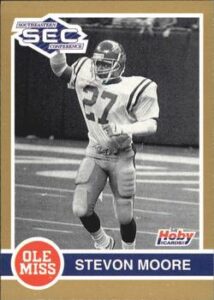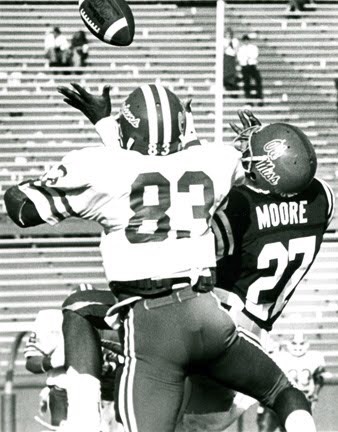Headlines
Column: How My Father Defied Racial Negativity to Excel at Ole Miss Football, in the NFL
By Tavia Moore
Hottytoddy.com intern
“Control what you can control,” is what my father, Stevon Moore mumbled under his breath as his eyes fixated on the massive oak trees driving through Coffeeville, Mississippi.

Stevon Moore.
As an 18-year-old, this was my father’s first opportunity to leave the crowded two bedroom, one bathroom 1940s bungalow on the outskirts of the scarcely populated city of Wiggins, Mississippi. Fortunately, his hard work, innate talent and one four hour and 21-minute long bus ride led him to The University of Mississippi on an athletic scholarship.
“I can’t let them down. I can’t let them down,” he said, thinking of his family during that bus ride.
Them — his siblings Joyce, Bruce, Buck, Roger, and his mother Ruby. Most of my father’s success can be credited to his siblings because it was they who sparked his love and passion for the game of football.
“I did not know what life outside of Wiggins looked like,” he said. “You can imagine how in awe I was of the campus when we first arrived. ”
As his shoes grazed the asphalt on Rebel Drive and he inhaled the crisp, coolness of the northern Mississippi air for the first time, my father was overcome by a newfound purpose. He chose Ole Miss for a reason. Yes, his family was in dire need of financial support, but his reason penetrated much deeper than that.
“In that moment I told myself that this was the beginning of the rest of my life,” he said. “I could hear the ridicules of the naysayers in the back of my head. They saw me as just another negro from the hood that would make nothing of myself, but I also heard mama’s voice telling me to defy all the odds that were stacked against me. And that’s exactly what I did.”
“They are gonna hang your black ass if you go up there boy,” one person from Wiggins told him.
“You got a death wish, don’t you Stevon?” another asked him.
“You know what they do to folks who look like us,” another said.
These are just a few quotes still embedded in my father’s mind. What pained him the most was the reality of their reservations – the rumors were true.
“Man… outside of football, life was hard,” he said, “Walking from the dorm to class every day was challenging because I was too afraid to take the bus, but trying to walk and withstand the cold weather was just as humiliating. The environment was completely different compared to back at home. I would not go as far as saying that they accepted me, but we all learned to tolerate one another.”
Separate from the derogatory whispers in his class lectures, my father’s experience on the field made his hardships more durable.
“The coaches at Ole Miss really helped to develop me into the person that I am today. Coach Billy Brewer was a father figure to me. He worked with me diligently to ensure that I could play both baseball and football on two athletic scholarships.”
My father said he recalls one game in particular—a road game against Tulane in New Orleans—and an intimate conversation he had with his coach.
“Coach Brewer and I had an intense talk about my future and role on the team. He told me that as long as I continued to invest my time and effort into the team, then he would continue to make strides towards bettering me as an athlete and a player,” he said.
He finished that game with three interceptions.

Moore intercepts a pass. Photo provided.
The next stage of his life was conspicuously the most prominent chapter of his story.
On a chilly Monday in 1989 around 7 a.m., my father was going about his normal routine before class. The smell and steam of rich coffee beans brewing clung to his nose, revitalizing him from his deep exhaustion. The days leading up to that morning he was aware that NFL prospects were fond of his skills, particularly the St. Louis Rams and the New York Jets. It was not a matter of if a team would call, but more importantly when, he said.
“I remember walking down the steps of my apartment and thinking to myself, ‘What if it’s today,'” he said. “I got the phone call around 8:05 a.m. while waiting on the transit to make its next stop.”
The St. Louis Rams called and promised to pick my father up if no other team chose him. He was overwhelmed with excitement because in that moment he had defied all of the odds. Fate had other plans, because within the next 10 minutes, my father would be selected as the 2nd pick of the seventh round of the 1989 NFL draft by the New York Jets.
His agent called and asked, “How does it feel to be drafted by the New York Jets?”
For a brief moment, my father was subconsciously in shock from his newfound success. The loud, unexpected sound of the shuttle depressurizing snapped him back to reality.
“Wow. I really did it. I’m really on my way to the league,” he said.
For the next 11 seasons, my father would dominate the sports industry by showcasing his skills in front of millions of fans at four distinct teams across the East Coast – The New York Jets, the Miami Dolphins, the Cleveland Browns, and the Baltimore Ravens.
“I cherished my time at Cleveland solely because of the fans. They are some of the most faithful and loyal supporters in the league,” he said.
The wear and tear, blunt force trauma, and countless other severe injuries due to high impact became too much for my father to bear. He was given an ultimatum to either retire with an astounding reputation or be on the injured reserve list for the next season until his health was restored. With a pregnant wife and ill father-in-law back at home, my father considered his options and decided to retire from the league with the Baltimore Ravens.
“There are many things that I cherish from my time in the league. One of the things that grabs me the most is the friendships with my teammates and their families. While spending time away from home, you meet new people and they potentially become your family,” he said.
Coming home to his native town of Wiggins, my father felt a rush of nostalgia. The discrete sound of rain on the window pane of his old bedroom, and the faint chaos of bluebirds rambling within the rose bushes in the backyard immediately transcended him back to his childhood. As he laid across his bed for the first time in years, trying to contemplate all of the accomplishments, tribulations, memories, and lessons he had experienced in his nearly 30 years of life, he felt a sense of comfort knowing he lived by his life’s mantra. So he closed his eyes, took a deep breath and whispered,
“Control what you can control.”

















Richard Burns
June 5, 2019 at 5:31 pm
The opening paragraph that mentions Coffeeville, Mississippi reminds me that there were two black brothers from Coffeeville High who played in the NFL: Marcus and Belton Johnson. Belton also played several years in the Canadian Football League. They were teammates at the same time for Ole Miss. This is a well-written article.
Phil Higginbotham
June 6, 2019 at 5:30 am
Very well done. I grew up in Cleveland and was probably at some of the games your father played in.